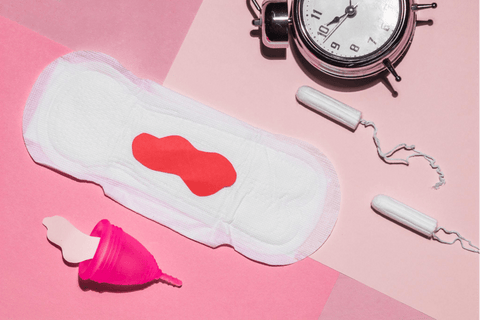PCOS and Menopause: Everything You Want To Know

Derived from the greek words ‘pausis’ meaning pause and mēn meaning ‘month’, ‘menopause’ literally means ‘the end of your monthly cycles’. While that may sound like a blessing, in reality, ‘menopause’ is a non-bloody nightmare. Remember Samantha’s hot flashes in the middle of Abu Dhabi from the famous SATC 2’ movie? While she summarises exactly how menopause feels, there’s more to it that just hot flashes. And we’re about to tell you everything about menopause and PCOS.

Perimenopause - When you feel cracked as an egg!
Perimenopause is the period leading up to menopause. And is normally the time when women experience hot flashes, irregular periods, mood swings, difficulty in sleeping, infertility, thinning of hair, weight gain, mood swings…sounds, just like your PCOS symptoms? While majority PCOS symptoms overlap with perimenopause, a few symptoms, like acne, pelvic pain and headaches are unique only to PCOS. And a few symptoms, like hot flashes, night sweats, painful or uncomfortable sex, urine leaks, UTI, dryness of the vagina, changes in sex drive are only associated with perimenopause.
Ways to reduce perimenopause symptoms● Control your weight with a healthy diet and regular exercise ● Improve your sleep by sticking to a sleep routine ● Limit your intake of alcohol, caffeine, and spicy meals to ease hot flashes |

PCOS & perimenopause - like fraternal twins, same but different!
The root cause of both PCOS and perimenopause ? Hormones! During perimenopause, your ovaries, (regardless of whether you have PCOS or not) start producing fewer hormones - particularly oestrogen and progesterone. And in women with PCOS that reach perimenopause, their excess androgen levels also may reduce as your ovaries produce less hormones overall. While, this may help resolve some of your symptoms associated with high androgen levels - like acne or baldness perimenopausal with PCOS still tend to have higher androgen levels than perimenopausal people without PCOS.
So, by your late 30s and through your 40s expect your periods to go out of whack. Some months, your cycle may become longer, some shorter, some may be heavier and some lighter. And more or less frequent. Until eventually — on average, by age 51 — your ovaries stop releasing eggs, and you have no more periods

Menopause - the midlife crisis
Menopause begins after your period takes a 12-month sabbatical and never returns! In other words, the end of your menstrual cycles, diagnosed after you've gone 1 year without your period.
So, once you hit menopause will your PCOS symptoms say goodbye too? Unfortunately, not. While, this is a common misconception PCOS very much stays with you even after you hit menopause. Between ages 20 and 40, testosterone levels in healthy women could reduce by 50%. But as per a study, this is slower in women with PCOS. And androgen levels did not reduce to normal until 20 years after menopause. That’s why your PCOS symptoms continue even if you’re no longer on your periods.
What should women with PCOS be careful after menopause?
Postmenopausal women with PCOS may see their androgen levels becoming stable or increase, while estrogen levels decrease dramatically. And prolonged exposure to hyperandrogenism may worsens health risks associated with PCOS and menopause. So, you should be keep an eye on symptoms of insulin resistance, chronic inflammation, imbalance of lipids such as cholesterol, and obesity as they tend to persist or worsen after menopause. Keep an eye on your blood pressure and BMI (body mass index). And continue eating a healthy, well-balanced diet along with regular exercise.

Post-menopause - To new beginnings!
Menopause symptoms last an average of 4.5 years after your last period, and 7.4 years in total according to a study. The study also suggests healthcare professionals advise people to expect a 7-year duration for their symptoms. And it notes that women who experience regular symptoms before the menopause or during the early stages may run a higher risk of a longer duration, with some women having symptoms for 11.8 years.
The silver lining post-menopause - no more periods, PMS, sex without pregnancy scares, end of hormonal headaches, your uterine fibroids shring and like American anthropologist Margaret Mead called it "menopausal zest" — a rush of energy, both physical and psychological, that some women feel after menopause.
Postmenopausal women also say they feel empowered, partly because of the biological changes that take place in menopause and partly because of the point in life at which menopause occurs. So, menopause isn’t so bad afterall - it’s just a chapter of our lives. If you own it, you can sail through it like a boss.
“So many women I've talked to see menopause as an ending. But I've discovered this is your moment to reinvent yourself after years of focusing on the needs of everyone else. It's your opportunity to get clear about what matters to you and then to pursue that with all of your energy, time and talent." — Oprah Winfre






